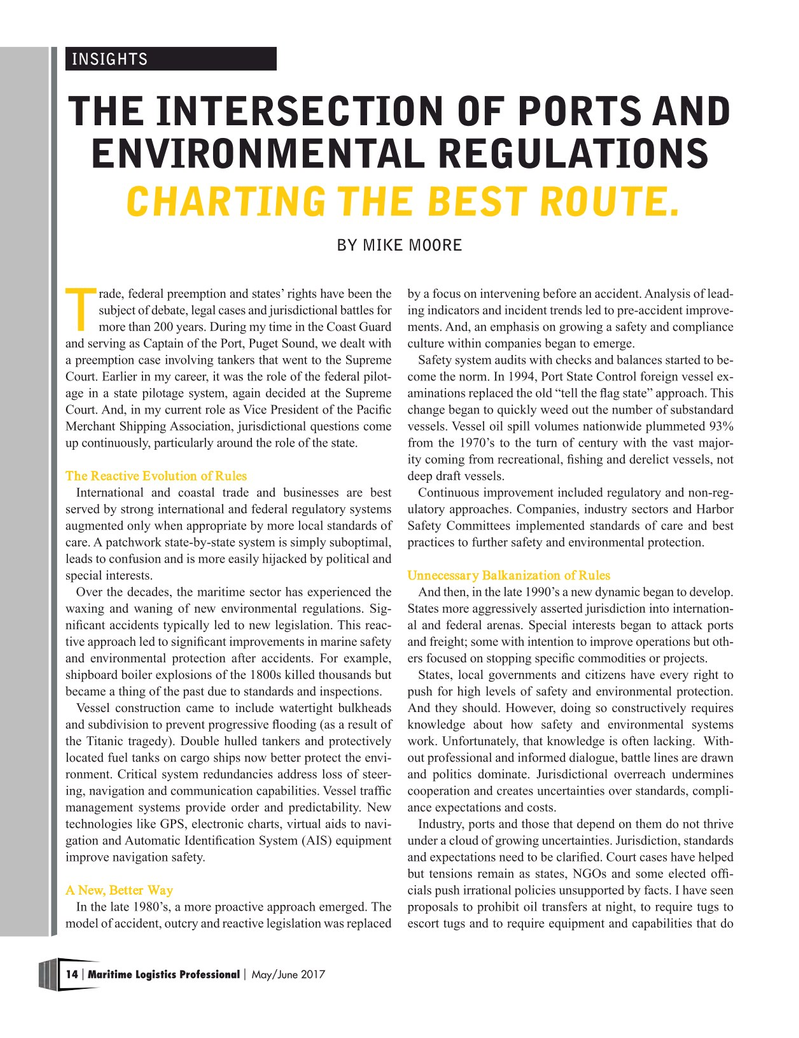
Page 14: of Maritime Logistics Professional Magazine (May/Jun 2017)
BUNKER OPERATIONS & PORTS
Read this page in Pdf, Flash or Html5 edition of May/Jun 2017 Maritime Logistics Professional Magazine
INSIGHTS
THE INTERSECTION OF PORTS AND
ENVIRONMENTAL REGULATIONS
CHARTING THE BEST ROUTE.
BY MIKE MOORE rade, federal preemption and states’ rights have been the by a focus on intervening before an accident. Analysis of lead- subject of debate, legal cases and jurisdictional battles for ing indicators and incident trends led to pre-accident improve-
Tmore than 200 years. During my time in the Coast Guard ments. And, an emphasis on growing a safety and compliance and serving as Captain of the Port, Puget Sound, we dealt with culture within companies began to emerge. a preemption case involving tankers that went to the Supreme Safety system audits with checks and balances started to be-
Court. Earlier in my career, it was the role of the federal pilot- come the norm. In 1994, Port State Control foreign vessel ex- age in a state pilotage system, again decided at the Supreme aminations replaced the old “tell the fag state” approach. This
Court. And, in my current role as Vice President of the Pacifc change began to quickly weed out the number of substandard
Merchant Shipping Association, jurisdictional questions come vessels. Vessel oil spill volumes nationwide plummeted 93% up continuously, particularly around the role of the state. from the 1970’s to the turn of century with the vast major- ity coming from recreational, fshing and derelict vessels, not
The Reactive Evolution of Rules deep draft vessels.
International and coastal trade and businesses are best Continuous improvement included regulatory and non-reg- served by strong international and federal regulatory systems ulatory approaches. Companies, industry sectors and Harbor augmented only when appropriate by more local standards of Safety Committees implemented standards of care and best care. A patchwork state-by-state system is simply suboptimal, practices to further safety and environmental protection.
leads to confusion and is more easily hijacked by political and special interests. Unnecessary Balkanization of Rules
Over the decades, the maritime sector has experienced the And then, in the late 1990’s a new dynamic began to develop. waxing and waning of new environmental regulations. Sig- States more aggressively asserted jurisdiction into internation- nifcant accidents typically led to new legislation. This reac- al and federal arenas. Special interests began to attack ports tive approach led to signifcant improvements in marine safety and freight; some with intention to improve operations but oth- and environmental protection after accidents. For example, ers focused on stopping specifc commodities or projects. shipboard boiler explosions of the 1800s killed thousands but States, local governments and citizens have every right to became a thing of the past due to standards and inspections. push for high levels of safety and environmental protection.
Vessel construction came to include watertight bulkheads And they should. However, doing so constructively requires and subdivision to prevent progressive fooding (as a result of knowledge about how safety and environmental systems the Titanic tragedy). Double hulled tankers and protectively work. Unfortunately, that knowledge is often lacking. With- located fuel tanks on cargo ships now better protect the envi- out professional and informed dialogue, battle lines are drawn ronment. Critical system redundancies address loss of steer- and politics dominate. Jurisdictional overreach undermines ing, navigation and communication capabilities. Vessel traffc cooperation and creates uncertainties over standards, compli- management systems provide order and predictability. New ance expectations and costs. technologies like GPS, electronic charts, virtual aids to navi- Industry, ports and those that depend on them do not thrive gation and Automatic Identifcation System (AIS) equipment under a cloud of growing uncertainties. Jurisdiction, standards improve navigation safety. and expectations need to be clarifed. Court cases have helped but tensions remain as states, NGOs and some elected off-
A New, Better Way cials push irrational policies unsupported by facts. I have seen
In the late 1980’s, a more proactive approach emerged. The proposals to prohibit oil transfers at night, to require tugs to model of accident, outcry and reactive legislation was replaced escort tugs and to require equipment and capabilities that do 14 Maritime Logistics Professional May/June 2017 | |

 13
13

 15
15
